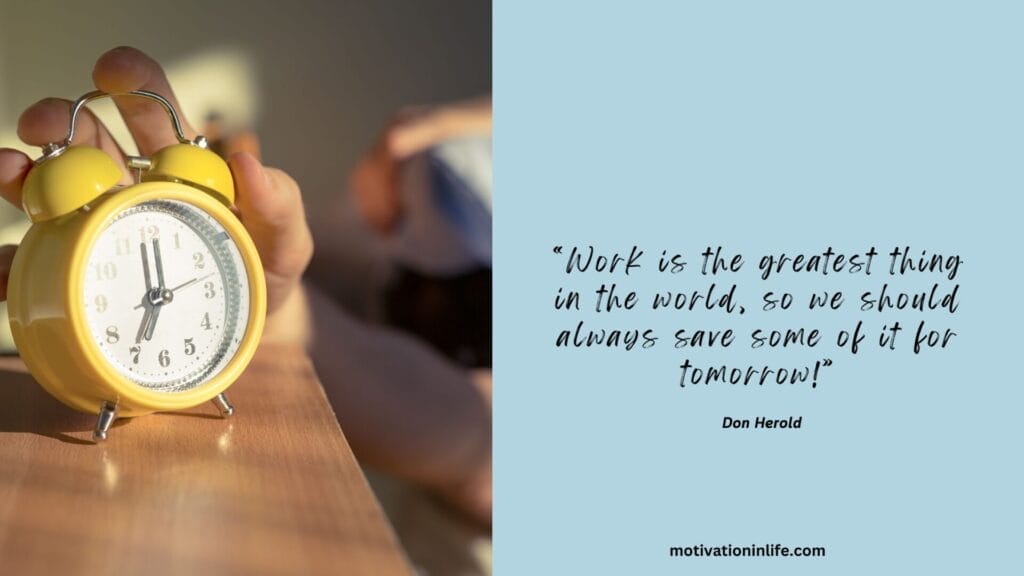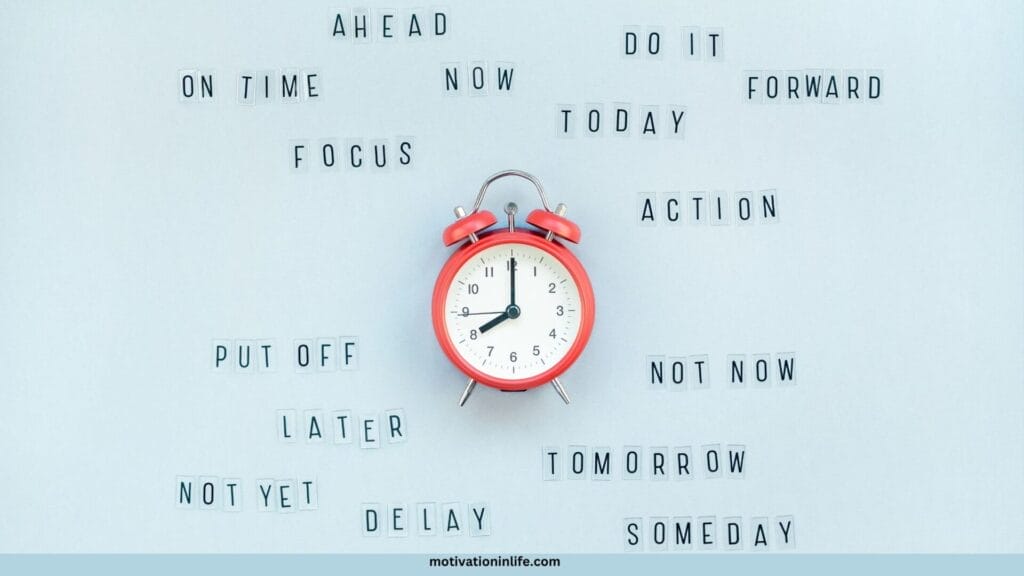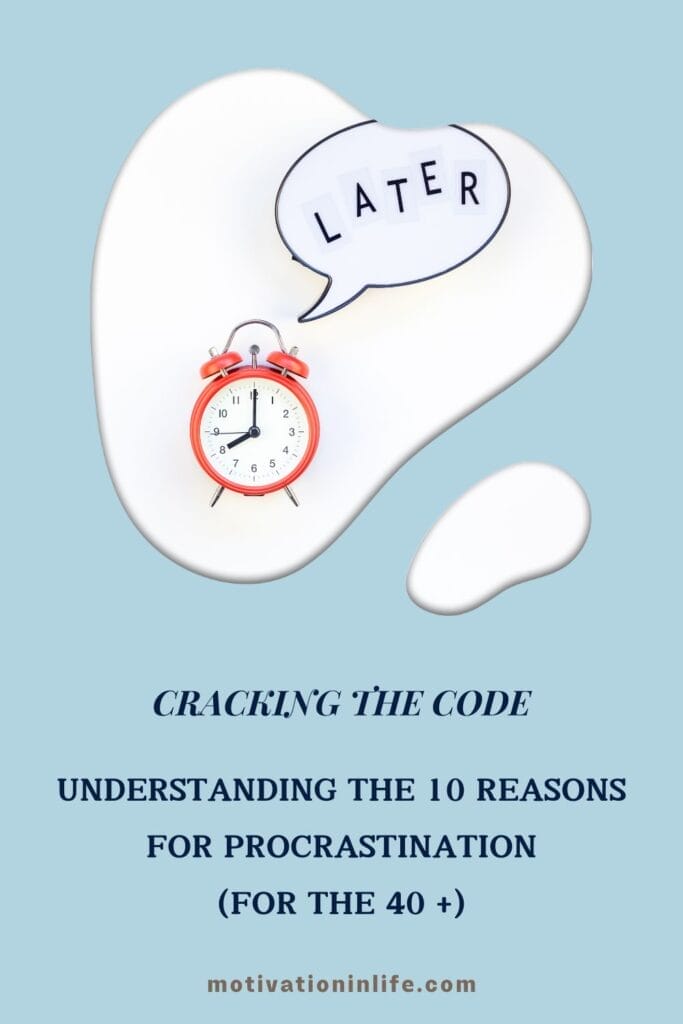Cracking The Code: Understanding The 10 Reasons For Procrastination (For The 40+)
“While wasting our time hesitating and procrastinating, life goes on.”
Seneca
Procrastination is a common adversary you face at some point in your life, and for those of you who belong to the 40-and-beyond club, it might seem like an old friend who just won’t leave.
In this blog post, we look at 10 reasons for procrastination that tend to linger longer as you age and explore 10 relatable factors and real-life experiences that might be holding you back.
Table of Contents
AFFILIATE DISCLOSURE
This post may contain affiliate links. We may earn a small affiliate commission at no extra cost if you click on them.
motivationinlife.com is also a participant in the Amazon Services LLC Associates Program, an affiliate advertising program designed to provide a means for sites to earn advertising fees by advertising and linking to Amazon.com and Amazon.in
We may earn a small commission for our endorsement, recommendation, testimonial, and/or link to any products or services from this website.
Reasons Why You Procrastinate As You Age
The art of procrastination is a masterpiece perfected with age! Once you hit the fabulous 40s, the procrastination habit constantly questions “Why do it now when you can do it… well, eventually” take over your life.
The theory behind the logic of procrastinating is, “It’s not that you can’t get things done, but why rush when you can take your sweet time?” Lol.
It’s like we’ve unlocked a new level of delaying stuff. Deadlines become more like gentle suggestions, and tasks like fine cheese are left to marinate, improving with age.
Want to stop procrastinating and take action? Download the Goal Planner we have designed for you using Creative Fabrica to set effective goals.
10 Reasons For Procrastination ( For The 40 +)
As responsibilities increase, procrastination can become a silent saboteur, subtly derailing your best-laid plans and delaying your aspirations.
As George Bernard Shaw aptly remarked, “Procrastination is the thief of time.” Therefore, once you are in your 40s and beyond, understanding the reasons for procrastination becomes essential in dealing with its negative consequences for your mental health in daily life.
Comfortable Routine Syndrome: Escaping Routine’s Grip
When you settle into your 40s and beyond, routines become your security blankets. The comfort of familiarity inadvertently causes procrastination. The fear of disrupting the status quo can paralyze you from taking on new challenges and hamper your productivity.
Susan is a vibrant and successful professional in her mid-40s. She has spent the past decade following a well-established routine.
Each day, she wakes up at the same time, commutes to work along the same route, and tackles her tasks methodically. This routine has become second nature to her, providing stability and predictability.
Now, Susan faces an opportunity for a career change—a chance to take on a new and challenging role in a different department. The prospect is exciting, but it also disrupts the comfortable routine she has meticulously crafted over the years.
The fear of the unknown and the potential challenges of change start to creep in. She hesitates to take action.
Susan finds herself reluctant to step out of her familiar routine. This hesitation manifests as procrastination. She delays deciding about the new career opportunity, rationalizing that she needs more time to weigh the pros and cons.
The routine, which once provided comfort, now acts as a constraint, preventing her from seizing a potentially rewarding challenge.
This example of Susan illustrates how the security of routines, while initially beneficial, can inadvertently lead to procrastination when faced with the prospect of change.
If you are someone like Susan, overcoming this habit of procrastinating involves recognizing the fear associated with disrupting the status quo and actively challenging it. This will allow you to accept new challenges and opportunities for personal and professional growth.
Please read our blog post, Why Your Routine Matters For Changing Life Habits (For The 40+), if you are keen on learning about why your daily schedule or routine is so important for setting the correct habits.

Fear Of Change: Being Weary Of The Unknown
With age comes experience, but it also brings a fear of stepping out of your comfort zone. The unknown can be daunting, and the older you get, the more you tend to stick to what you know, even if it means wasting time putting things off.
Take the example of Jenny, a 50-year-old mother of two who has been living in the same neighborhood for the past two decades. She’s comfortable with the place—familiar people, predictable grocery store aisles, and a routine evening stroll around the local park.
One day, Jenny’s family suggests considering a different neighborhood for their next home. The idea of moving to a new area brings a mix of emotions. While the family sees it as an exciting adventure, Jenny feels a twinge of discomfort.
The thought of leaving behind the familiar streets and neighbors she has known for years makes her uneasy. In this situation, the fear of change is palpable. Jenny has grown attached to the idea of her current neighborhood, and the unknowns of a new area feel daunting.
The idea of exploring a different grocery store, getting to know new neighbors, and adjusting to a new evening routine creates a sense of anxiety. As a result, Jenny procrastinates in deciding to move. She delays discussions with her family and puts off exploring potential neighborhoods, clinging to the comfort of what she already knows.
The fear of stepping out of her well-established comfort zone becomes a subtle but powerful force influencing her actions.
This example of Jenny goes to show how the fear of change can manifest in your everyday life as well, especially as you age, leading you to procrastinate and doing something about decisions that involve venturing into the unknown.
Overcoming this fear involves acknowledging the discomfort, gradually embracing change, and recognizing the potential for new and positive experiences that may lie beyond the boundaries of the familiar.
If you are contemplating looking for a new beginning, read our blog post on How to start fresh in life (for the 40+)

The Pitfalls Of Perfection: When Pursuing Excellence Hinders Progress
As you accumulate more life experiences, the desire for perfection tends to peak. People procrastinate in their pursuit of flawless outcomes, as the fear of not meeting their high standards becomes a barrier to starting a task.
Laura is a successful professional with a passion for photography. Over the years, she has honed her skills and built a reputation for capturing stunning images. However, as she hits her 40s, Laura’s desire for perfection reaches new heights.
One day, Laura decided to start a personal photography project, creating a portfolio showcasing the diverse landscapes of her hometown. Excitement surges through her as she envisions the finished product, but this enthusiasm quickly gives way to paralyzing fear.
As Laura begins selecting photos for the project, she becomes increasingly critical of each shot. The desire for perfection takes center stage, and she finds herself scrutinizing every detail, from composition to color balance.
Laura sets impossibly high standards for each image, convinced that anything less than flawless would tarnish her reputation as a photographer.
The fear of not meeting her sky-high expectations becomes an obstacle to starting the project. Laura can’t stop procrastinating, telling herself she needs more time for research and planning.
Days turn into weeks, and the project remains untouched as the pursuit of perfection becomes an unintentional roadblock. Laura’s perfectionism, which has grown stronger with time and success, becomes a hindrance to her development. While it has played a crucial role in elevating her skills, it now prevents her from taking the first step in her new venture.
How many of you can relate to this example of Laura?
Overcoming this form of procrastination involves acknowledging that imperfections are a natural part of any creative process. You should not let it prevent you from completing tasks.
The pursuit of perfection shouldn’t stand in the way of initiating a project you are passionate about.

Time Perception Shift: Tug-of-War With Time
The older you get, the more you become aware of the preciousness of time. Paradoxically, this awareness can sometimes lead to procrastination, with the thought that there’s always time to start later.
Spoiler alert: time waits for no one!
Take the example of Carol, a spirited 45-year-old with a bucket list brimming with dreams. One of her lifelong aspirations is to learn to play the piano. However, the awareness of time’s preciousness creates a peculiar paradox in her mind.
Carol, mindful of the ticking clock, decides that now is not the right time to start her piano lessons. She believes there’s always time to pursue this passion later, perhaps when things are less hectic.
The irony lies in her perception—the very awareness of time’s value becomes a reason to postpone, leading to a procrastination loop preventing her from overcoming procrastination.
Days turn into weeks and weeks into months, with the piano sitting quietly in the corner, untouched. Carol’s intention to start later becomes a deceptive comfort as time slips away faster than she realizes.
The very awareness that time is precious, meant to motivate, inadvertently becomes a procrastination pitfall.
For Carol, this is indeed a catch-22 situation. The more Carol becomes aware of time’s fleeting nature, the more she postpones, underestimating the importance of starting now. The piano, once a symbol of musical dreams, remains silent, echoing the reminder that time indeed waits for no one.
Carol’s tale illustrates, how you may, once you are beyond your 40s, fall prey to the illusion of perpetual tomorrows.
Overcoming this paradox involves a shift in mindset—realizing that the best time to start is now, embracing the journey, and savoring the precious moments along the way.
After all, in the melody of life, each note counts, and delaying the tune only diminishes its richness.
Please read our blog post on reinventing yourself in your 40s to get over your mental block of not letting go and procrastinating over it.

Overwhelming Options: Confused with The Sea Of Options In Your 40s
In a world filled with endless possibilities, decision fatigue can set in. The 40-and-beyond club often faces a multitude of choices, causing paralysis by analysis and delaying important decisions or actions leading to poor time management skills.
Robert is a vibrant 42-year-old with a zest for life and an ever-growing list of hobbies he wants to pursue. From taking up painting to learning a new language, the possibilities seem endless.
However, Robert finds himself in a peculiar predicament—overwhelmed by the sheer abundance of choices.
One weekend, Robert decides he wants to start a new hobby. Excited, he sits down with his laptop, ready to explore the vast world of possibilities. He devours social media and various online platforms to look for options.
As he considers various options, the multitude of choices starts to weigh on him. Should he pick up a brush and paint landscapes, or dig deep into the intricacies of digital art?
Perhaps learning French would be exciting, but then again, mastering the guitar holds its allure.
Caught in the web of countless possibilities, Robert experiences decision fatigue. The more he contemplates each option, the more indecisive he becomes. The once-exciting prospect of a new hobby now feels daunting, causing a sense of paralysis by analysis.
Days pass, and Robert finds himself no closer to starting his new venture. The overwhelming array of options has inadvertently become a roadblock, delaying his decision to start a fulfilling hobby.
The irony is that the desire to make the perfect choice has hindered any choice at all.
Robert’s experience highlights the challenge many of us who are aged 40 and above face—a plethora of possibilities leading to decision fatigue and procrastination. It is one of the main reasons for procrastination among people in general.
Overcoming this dilemma involves acknowledging that there’s no one-size-fits-all answer and taking the first step, knowing that the journey itself is more rewarding than endlessly pondering the choices at hand.

Tech Trepidation: Confronting Tech Hassles For the 40 +
While technology has advanced at an astonishing pace, some in the older demographic might find it intimidating.
The learning curve associated with new tools and gadgets can be a breeding ground for procrastination, as the fear of the unknown sets in.
Take the example of Emily, a 42-year-old with a passion for writing and a burning desire to share her thoughts with the world through a blog.
Eager to embark on her blogging journey, Emily faces a daunting challenge: the technical intricacies of starting a blog. Excitedly, Emily starts researching platforms, domain names, and website hosting options.
However, the more she looks into the technical aspects, the more overwhelmed she becomes. Terms like CMS, SEO, and plugins start to sound like a foreign language, and the fear of making the wrong tech choice looms large.
Days turn into weeks, and Emily’s dream of becoming a blogger takes a backseat. The initial enthusiasm gives way to a sense of procrastination as the tech hassles become a formidable barrier.
The idea of setting up a website, managing themes, and understanding analytics feels like an insurmountable mountain to climb. What Emily does not understand is that the world of blogging is waiting for her unique voice and insights. Yet, the fear of the unknown tech landscape has put her dream on hold.
Little does she realize that starting a blog doesn’t require mastering every tech term; it’s about sharing stories and connecting with an audience. Emily’s story mirrors the struggle of aspiring bloggers who find themselves entangled in technical intricacies.
I for one, can relate to Emily’s story. Like Emily I also got overwhelmed after the initial enthusiasm of starting this blog.
It was then that I met my coach, Sadie Smilie, and joined her membership, in which I not only learned all the nuances of blogging but also got to meet many other aspiring bloggers who are now friends for life!!.
I met Carolina Velis, and I met Diana Houghton. They are an inspiration to me, as they taught me that age is just a number, and if you are willing to learn and have a passion to achieve your goals, nobody can stop you!!
Do you also want to learn something new, start a blog, or create digital products, and the tech overwhelm has gotten the better of you? Stop procrastinating.
Remember that overcoming this tech-induced procrastination involves breaking down the journey into manageable steps, seeking guidance, and remembering that you need to take baby steps rather than mastering every digital tool.

Memory Mayhem: Dealing with Memory Mayhem In Your 40s
As you age, your memory might not be as sharp as it once was. The fear of forgetting important details or making mistakes due to memory lapses can lead to procrastination, as you hesitate to work on tasks that require mental agility.
Paula, a 45-year-old had a knack for storytelling. Inspired to pen down her life experiences, Paula decides to start writing a memoir. However, as she sits down to capture the vivid memories of her youth, she notices a nagging concern—her memory isn’t as sharp as it used to be.
Fearing she might forget crucial details or make mistakes, Paula hesitates to dive into her writing project. The fear of memory lapses becomes a mental roadblock, and the once-enthusiastic endeavor turns into a procrastination puzzle.
Days go by, and Paula finds herself putting off the memoir, waiting for a moment when her memory feels more reliable. Little does she realize that the act of writing itself could serve as a mental exercise, helping preserve and strengthen her recollections.
Do you relate to Paula’s story?
Overcoming this mental hurdle involves acknowledging the imperfections of the memory, trusting the writing process, and understanding that the act of capturing memories can be as rewarding as the memories themselves.

Excessive Commitments: Handling the Barrage Of Responsibilities
Once you cross the age of 40, you often have to juggle numerous responsibilities, from work commitments to family obligations.
The sheer volume of tasks can be overwhelming, leading to procrastination as you struggle to prioritize and manage your time effectively. You feel that you do not have the motivation to do something to overcome procrastination.
Take the example of Rose, a dynamic 42-year-old professional with a thriving career and a bustling family life. Excited about her long-time dream of starting a gardening project, Laura envisions a backyard oasis filled with vibrant blooms and lush greenery.
However, the moment she pulls out her gardening gloves, a barrage of notifications floods her phone: work emails, school updates, and family requests.
The sheer volume of responsibilities overwhelms Rose, and the gardening dream takes a backseat to the demands of daily life. As the days pass, Rose finds herself tangled in the task tango, juggling work deadlines, school events, and family commitments.
Procrastination sets in as she struggles to prioritize among the myriad of responsibilities, each competing for her attention.
Rose’s story paints a vivid picture of how once you are in your 40s and beyond, you procrastinate on personal passions amidst the whirlwind of responsibilities.
Overcoming this involves carving out intentional moments for personal pursuits, and realizing that nurturing your dreams is an essential part of life. All you need to do is hone your time management skills and chase your dreams with purpose.
If self-care is something that always takes a back seat in your life, read our blog post Simple Self-Care Practices For Impactful Positive Change In Life (For The 40 +)

The Ripple Effect Of Tomorrow: Tackling Procrastination In Your 40s
In your younger years, the consequences of procrastination might have been more immediate and tangible. As you age, some tasks may not have immediate repercussions, making it easier to postpone them. However, delayed actions can accumulate over time.
Steve, a 48-year-old fitness enthusiast, resolves to maintain a consistent workout routine. In his younger days, skipping a workout would lead to an immediate sense of sluggishness and guilt. As Steve hits his 40s, he notices the consequences of skipping a workout aren’t as immediate.
A day off here and there doesn’t seem to impact his energy levels drastically. The lack of instant repercussions makes it tempting for Steve to postpone workouts at the last minute, thinking he can always start again tomorrow.
Unbeknownst to Steve, the delayed actions start to accumulate. Weeks turn into months, and the once-vibrant fitness routine becomes a distant memory. The immediate consequences might be elusive, but the long-term effects of procrastination gradually take a toll on Steve’s overall well-being.
Steve’s story highlights how the lack of immediate consequences for certain tasks can create deceptive comfort, leading to procrastination.
Overcoming this hurdle involves recognizing the cumulative impact of delayed actions and embracing the philosophy that consistency today builds a healthier tomorrow.
Please read our blog post on Healthy Habits To Start Today For The 40+ to decide which habits you want to start inculcating for a healthier life.

Self-Reflection Roadblock: Dealing with Self-Awareness In Your 40s
With age comes a heightened sense of self-awareness. The fear of failure or not meeting your expectations can lead to procrastination. You tend to spend more time reflecting on your life choices and goals as you hit midlife.
Take the example of Alexa, a 41-year-old professional with a passion for writing.
Alexa finally decides to write the first chapter of a book because it has been a lifelong goal. However, as the words flow onto the page, a subtle fear creeps in. With each sentence, Alexa becomes acutely aware of the weight of expectations.
The desire to create a masterpiece, coupled with the fear of falling short, slows down the writing process. The heightened self-awareness becomes a source of her procrastination, as Alexa finds every paragraph under the scrutiny of personal expectations.
Days turn into weeks, and the novel remains a work in progress. Alexa, caught in the loop of self-reflection, spends more time pondering the significance of the story than actually telling it. The fear of not living up to personal aspirations becomes a procrastination hurdle, delaying the fulfillment of a long-held dream.
Alexa’s journey encapsulates the challenge many face in their 40s and beyond—the delicate balance between self-awareness and the fear of falling short.
Overcoming this reflective roadblock involves embracing imperfections, and understanding that progress is a process and that the journey of self-discovery is as valuable as reaching the destination.

Perceived Lack Of Time: Unraveling The Perceived Scarcity
As responsibilities pile up with age, you may feel like there simply aren’t enough hours in the day to tackle everything on your to-do list. This perceived scarcity of time can lead to procrastination, as tasks get pushed aside in favor of more immediate priorities.
Take the example of Sarah, a 45-year-old executive juggling a demanding career, a hectic family life, and various community commitments. With her calendar packed to the brim, Sarah constantly feels like there’s never enough time in the day to tackle everything on her plate.
Each morning, Sarah wakes up with a laundry list of tasks running through her mind, from project deadlines at work to school events for her children to volunteer obligations in her community.
Despite her best efforts to prioritize and manage her time effectively, it often feels like she’s fighting a losing battle against the clock.
In the face of this perceived lack of time, Sarah procrastinates on certain tasks, especially those requiring significant time and effort. Instead of tackling them head-on, she pushes them aside, hoping for a moment of respite that never seems to come.
For example, Sarah procrastinates on starting a home improvement project because she believes it will require a significant time investment that she currently doesn’t have. Instead, she opts for quick-fix solutions or puts off the project indefinitely, hoping for a future period of less hectic schedules.
Despite her best intentions, Sarah’s procrastination becomes a self-perpetuating cycle, as the perceived lack of time leads to further delays in addressing important tasks.
If you are constantly struggling to overcome the perceived lack of time and avoid procrastination, try breaking tasks down into smaller, more manageable chunks.
By tackling tasks in bite-sized portions, you can make progress even when time is tight. Additionally, prioritize tasks based on their importance and urgency, allowing you to focus on what truly matters most.
Finally, consider setting aside dedicated time blocks for specific tasks each day, creating a structured schedule that helps maximize productivity and minimizes the feeling of being overwhelmed by a lack of time.
You can get this intentional week success guide which has been designed by my friend E Beecroft and is an actionable guide that will help you create a weekly plan and a schedule that promotes intentional living.

Energy Ebb: Confronting The Drain Of Physical Exhaustion
As the body ages, energy levels may decline, making tasks feel more physically taxing. This fatigue can contribute to procrastination, especially in your midlife, as you may put off tasks that require physical effort in favor of more restful activities.
Mike, a 50-year-old construction worker, loves his job but finds himself battling physical fatigue after long days of manual labor. Despite his passion for his work, Mike often struggles to summon the energy to tackle tasks outside of his job responsibilities.
After a grueling day at the construction site, Mike returns home feeling drained and exhausted. The thought of tackling household chores or working on personal projects feels overwhelming in his fatigued state.
Even simple tasks like mowing the lawn or fixing a leaky faucet seem like monumental challenges when coupled with his physical exhaustion.
Mike therefore finds himself procrastinating on these tasks, putting them off until the weekend or until he feels more rested. However, the cycle continues, as the weekends are often filled with recuperating from the week’s physical demands rather than catching up on neglected tasks.
Physical fatigue for people above 40 can become a significant obstacle to productivity and can lead to procrastination. To overcome this, it’s essential to prioritize self-care, including adequate rest and recovery.
Consider scheduling tasks during times of the day when your energy levels are typically higher. Finally, don’t hesitate to delegate tasks or ask for help when needed, lightening your workload and reducing the burden of physical fatigue.

Legacy Concerns: The Weight Of Leaving A Lasting Mark
As you reach middle age and beyond, you start thinking more about your legacy and the impact you’ll leave behind.
This increased sense of importance attached to your actions and accomplishments can sometimes lead to procrastination, as you feel overwhelmed by the pressure to make every decision count.
You might delay taking action out of fear of making the wrong choice or failing to leave a meaningful inheritance
Take the example of Jennifer, a 48-year-old marketing executive who has achieved success in her career but finds herself grappling with legacy concerns as she approaches midlife.
Jennifer has always been ambitious and driven, striving to leave a lasting impact in her professional and personal life.
As Jennifer reflects on her accomplishments, she begins to ponder her legacy and the mark she’ll leave on the world. She wonders if her work truly matters and if she’s making a meaningful difference in the lives of others.
This sense of importance she attaches to her actions and achievements starts to weigh on her, creating a sense of pressure to make every decision count.
For example, Jennifer procrastinates pursuing a new career opportunity because she fears it won’t align with her long-term goals or contribute to her desired legacy.
She hesitates to take risks or step outside her comfort zone, opting for the safety of familiarity rather than embracing new challenges. Legacy concerns can become a significant factor contributing to procrastination if you are someone like Jennifer.
To overcome this, it’s essential to focus on the present moment, set realistic goals, and remember that each small step taken today contributes to shaping your legacy over time.

Top 10 Reasons For Procrastination: Key Takeaways
If you are a chronic procrastinator or procrastinate once in a while, one or the other of the 10 reasons why people procrastinate beyond their 40s mentioned in the post will resonate with you.
However, understanding the causes of procrastination is the first step towards overcoming it.
The 40-and-beyond club faces unique challenges, but by acknowledging these factors, you can take proactive steps to tackle procrastination head-on and embrace a more productive and fulfilling life.
After all, age is just a number, and there’s no time like the present to conquer procrastination and achieve your goals.
Recommended Books To Eliminate The Habit of Procrastination
- Eat That Frog By Brian Tracy (Amazon.com | Amazon.in)
- The Procrastination Equation By Piers Steel, Ph.D (Amazon.com | Amazon.in)
IF YOU ENJOYED READING THIS POST, PLEASE PIN ONE OF THESE IMAGES BELOW!
I will be grateful for your kind gesture. Thank you!











